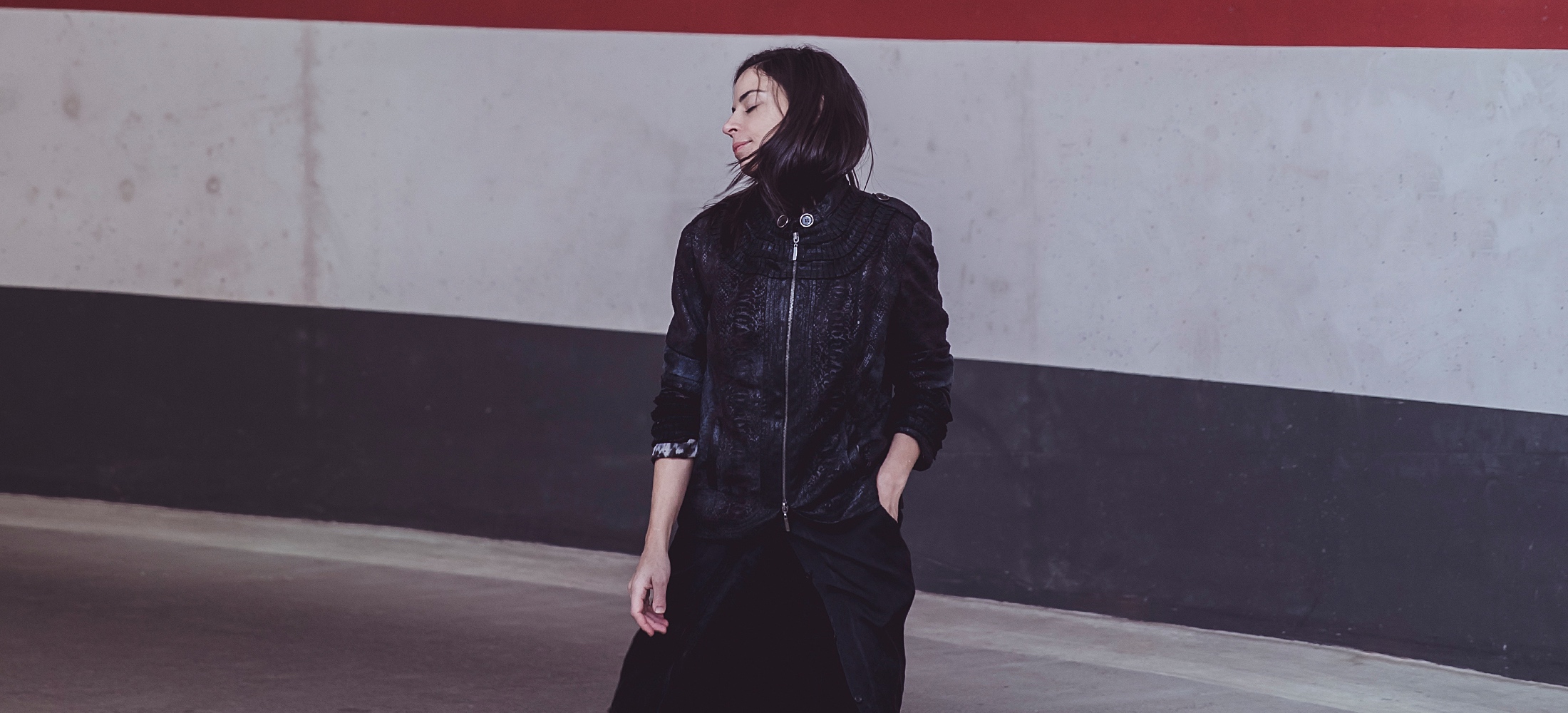Maayan Nidam: Forever Present
A moving story from a private artist.

Maayan Nidam: Forever Present
A moving story from a private artist.
Maayan Nidam released her first album in six years last month. Titled Sea Of Thee, and available now via Perlon, the release was the result of an extremely creative two-week period, itself sparked by the end of a romantic relationship. In a rare media engagement, Nidam invited William Ralston to sit down with her to hear the deeply moving tale behind her latest work and the drastic life changes it has inspired.
Wrapped up warm in a long, camel coloured coat, Maayan Nidam arrives to meet me at one of her favourite cafes in Kreuzberg, Berlin. She strolls along with her hands tucked deep in her pockets and employs a baseball cap and some reflective aviator sunglasses to mask her face from the sun; her pristine pink Adidas trainers are the exception to an otherwise understated wintery outfit. Once settled in the shade, she removes her accessories to expose her newly straightened jet black hair and a pretty smile, borne from nerves, one would assume. We begin with a light conversation about Sea of Thee, her third full-length effort, her first on Perlon, and order a large coffee and a pot of Moringa tea for me and her respectively. It’s a light-hearted and necessary exchange, the prelude to a deeply moving story that she wishes to divulge. While the hypnotic techno aesthetic of her latest release might be what we’ve come to expect from Nidam, it is also emblematic of her significant transformation.
Evidence for such is plentiful. On a professional level, Nidam has joined Yoyaku, the Paris-based booking agency, and has since found herself playing out more, as a DJ but also a live act, especially at more techno-orientated events, two long-standing objectives. It has taken some time for promoters in these circles to familiarise themselves with her deeper, darker aesthetic, and also for her to fine-tune her live act, but she’s now seeing a return on her investment. She’s also started her bi-monthly Hellium night at Renate and will soon relocate it to Tresor; meanwhile, plans are in place to start a label of the same name. On a personal level, however, these changes are more subtle. Nidam, an intensely guarded individual, keeps news close to her chest, especially that of a more personal nature, speaking only with a select few with whom she feels comfortable; besides her booker, Tracy Bakala, and a handful of friends, she confides in her two sisters and her parents, who reside on the outskirts of Tel Aviv, Israel, the place of Nidam’s birth. In our conversations, however, it’s clear that something is different: though as softly-spoken and make-up-free as always, she’s energetic and fresh-faced, smiley and easy-going despite the challenging subject-matter; by and large, she appears more at ease with herself than I’ve seen her before.

2017 represented a significant speed-bump on Nidam’s road to contentment. It began with an extended break in Vietnam where she played the opening edition of Epizode festival, but by Spring a disharmony in her romantic relationship had started to shake her foundations, causing her professional unsettlement and personal discontent to bleed into one another. Questions over her sound, still in transition, became louder, as did those surrounding her live set; progress was being made but it was slower than she had anticipated, and communication with her partner, who had long been uniquely privy to these doubts, was breaking down, compounded by their respective travel commitments. Her partner decided to end the relationship in July. “My world turned upside down overnight,” Nidam recalls. “Everything was different and I was alone and that was it.”
A feeling of shock gave way to a deep depression. Rather than welcoming the support of her friends and family, who were reluctant to push in the knowledge that she would reach out if she was ready, Nidam disconnected from society even further, honoring bookings but minimizing new ones, while socializing little. She hoped that the sadness would soon come to pass; trips to New York for a Get Perlonized showcase and to Ibiza for gig, supported by her sisters, who flew over at late notice from Los Angeles and Tel Aviv respectively, only delayed the inevitable. By August, back in Berlin, she was finding it hard to get out of bed never mind leave her home and the enduring comfort of her cats, Salty and Schmitz. Mental anguish also brought with it various physical pains for which she resorted to high strength weed edibles. “It was small on the surface but there were lots of emotions and I had a lot of self doubt as a person,” she recalls. She felt “inadequate” in her late 30s “in such a dark situation and alone.”
Winter brought with it more darkness. But Nidam forced herself to leave her house, recognizing that she had to move forward and break the solitude. She began reconnecting with friends—dinner, drinks—but, terrified of being in the studio alone, she found any excuse to avoid it. So she was more than happy to accept a dinner invitation, but suggested that afterwards her two friends accompany her to the studio, to “hold her hand.” Later that night, with her friends behind her, Nidam reacquainted herself with her machines. “I started the engine,” she explains, and she didn’t turn it off for two weeks. In what she labels an “extremely creative time,” Nidam found herself drawn to her studio, sometimes even sleeping there, playing the guitar, writing songs, and making “little techno tunes” all alone, oblivious to the outside world. “Everything was off and I had nothing to hold on to except for the studio,” she recalls. “I really didn’t have a plan but I felt like something really wild was happening and I really wanted to just let it take me wherever it needed to take me because I was completely lost.” She explains that “music just kept on coming out.”
These periods of extreme creativity are not common. Although studio time plays a large role in her life, her motivation to spend prolonged periods there, making music and just experimenting, often wanes without an impending and important deadline. It is for this reason that her releases have been infrequent; she hasn’t shared a substantial body of new material since 2012’s New Moon, which itself was more a compilation of unreleased works produced over an extended period rather than anything with a clear underlying concept. Moreover, 2009’s Nightlong, a commission from Powershovel Audio to interpret old songs, was in part driven by the expectations of the Japanese label. Nidam says that she has experienced periods of heightened creativity before but that this was the first time she had felt like it’s not her “leading the way.”
The experience she describes is one of disconnect between herself and the person making the music. “Maybe it was like this higher self that was still there, like a part of my consciousness that was still taking care to make sure I was alright, giving me a guiding hand,” she explains. In terms of melodies and arrangements, she recalls that they sounded like her in a “parallel universe”; meanwhile, the lyrics—including those on the album opener, “Dust and Dirt”—only really made sense to her several months after she’d recorded them. Instead of judging the music, she tried to accommodate it by adapting her studio setup accordingly. She returned home after two weeks, exhausted, with the creativity subsiding. Even now, when she hears the music, she doesn’t recognize who made it.
Nidam didn’t return to those recordings until late December. She began the editing process in her second studio, located in the small backroom of her apartment, her mood as low as her expectations. She explains how the music felt like a “mirror” of her “abstract emotions,” something that reviews of the record have picked up on. She spent Christmas Day with some friends in Berlin, indulging accordingly, and the following morning, having ran out of things to listen to, she played the recordings out for the first time and realized that she liked them. Early in the new year, she packaged 10 tracks up and sent them to Thomas Franzmann (a.k.a Zip) who replied with a selection and a proposed tracklisting for an album. “He understood the story better than I did,” Nidam explains, “and he tells it better with eight tracks than 10.”

That creative release inspired a drastic change of tack in Nidam’s life. She recalls how a vivid realization, like “someone tapping me on the shoulder,” that she was “daydreaming while driving” led her to take things into her own hands. The music gave her strength to fix her life, to start work on the depressive episode; to have “one last try at being happy,” she adds. Although she doesn’t say it explicitly, it becomes clear just how riddled with hopelessness this period was. As with any true artist, self-doubt has always been a part of Nidam’s life, but her fondness for the fruits of her two-week staycation replenished her self-worth. On a deeper level, play-back of the album communicated a message that she should trust in “just getting out of the comfort zone and doing something wild,” she recalls. She decided to apply this to her life outside of the studio by getting out of the “frame that is holding me back,” she says.
Nidam returned home intent on finding a solution. She’d been researching methods for curing the body, of overcoming her physical and mental anguish, for several months but it wasn’t until now that she had been really invested in the endeavor. She realized that the problem she had was not so much with the issues themselves but with her relationship with them. Quoting a passage she read in a book, she says, “…if you don’t change the way you perceive the problem, it will keep on being a problem.”
Her early research suggested that she had chronic inflammation that affects the mood, more common than one may think, and so she undertook a 10-day water only-fast, aiming to disrupt her system and cleanse the mind and body. She sought to let go of her disappointment, anger, and frustration to which the ego was attaching.
Among her areas of interest were indigenous medications and micro-dosing. She began reading studies and books on LSD and psilocybin, the psychedelic compound found in magic mushrooms; until the mid-1960s, when the Nixon administration shut it down, research had illustrated that psilocybin can offer a cognitive tool for combatting depression and addiction. It’s only over the past decade that research has continued and Nidam found herself enthralled with these findings. Noted writers and journalists on addiction, mental health, and spirituality, among them David A. Kessler, Sam Harris, Michael Pollen, Johann Hari, and Rupert Spira became reference points for her explorations. Meanwhile, Robin Sharma’s quote “the mind is a wonderful servant but a terrible master” became her foundation.
The first step was to disrupt her stagnant thinking patterns, “the self-absorbed, self-judging, self-hatred-infused thoughts,” she says. Removal of cigarettes and, more notably, alcohol, on which she had never been too far from dependent, was a great way of breaking free: barring one hiccup, Nidam hasn’t had a drink since Christmas day 2017, a remarkable achievement given the industry’s widespread encouragement of intoxication. While the commitment exacerbated problems to begin with, bringing dark recollections to the surface and removing her numbing agent, it’s now having a tremendous affect on her physical and mental health; long-gone is the fatigue that has plagued her existence. She looks happy and light, and those who know her tell me that she’s “more welcoming” and “open to ideas.” Our exchanges reveal something similar; she’s much more easy-going than I can recall.
In many ways, sobriety is emblematic of her work, a daily reminder of her commitment to the cause; but, more importantly, it offers her clarity of mind, self-awareness, and self-control, all fundamental when it comes to training the brain to pursue positive thinking patterns. The example she uses is as follows: at a gig, she can either focus on the drunk person at the front, fooling around, which makes her feel too old or inadequate; or she can focus on the fans at the front, many of whom have travelled a long way to see her play, which make her feel strong, fortunate, and free to experiment with the abstract records she keeps in her record bag for those occasions when she feels comfortable. Inebriation makes her vulnerable to negative self-thought that draws her focus to the former and, worse still, reinforces these pathways.
By and large, Nidam also stays away from narcotics. The only caveat is her research into “Amazonian medicines” that has been invaluable in managing her depression because such mind-altering substances offer a “new experience” and a “feeling of wonder” that combat the self-absorption around which her condition orbits.
It’s a practice that Nidam describes as “dissolving the ego.” Research dictates that sufferers have a tendency to wallow in self-destructive thoughts because the brain doesn’t allow them to perceive much else; in essence, the ego attaches itself to negative thought patterns, trapping the sufferer in a race to the bottom. Psilocybin offers a profound connection, breaking “your addiction to yourself,” says researcher Bill Richardson, and, in doing so, one’s addiction to the ego. It does this by weakening the mechanism that controls how much information comes into the brain, opening the gates for more stimuli, negative and positive. While the former brings more pain, it has allowed Nidam to see the pain of others, bringing her out of her self-absorbed patterns; and the latter helps to lift the spirit. The challenge comes with focusing on these positive thoughts, hence the importance of being healthy and sober. As a result, she finds herself “surrounded by love” that until now her condition had rendered her oblivious. “I believe all that love from around me was there but I just didn’t see it,” she says. Regular meditation allows Nidam to preserve and amplify these breakthrough moments.

It goes without saying that such adjustments haven’t come easily. Nidam began touring heavily again at the start of this year, and initially struggled with the expectations of others, many of whom assumed she wanted to drink as normal. Nowadays, as people learn about her steps, it’s becoming easier for her to stick to them, though it remains a work in progress. Anxiety attacks still come and go—perhaps a natural part of being a vulnerable and self-critical female in a sociable world—but Nidam recognizes that this is her mind adapting to sobriety. “Beforehand, when I felt uncomfortable, I would have a drink to relax but now I have nothing but my breath to calm me down,” she says, “but I am learning how to manage them [attacks].” Moreover, sobriety makes her feel self-conscious because she doesn’t want people to think she is judging them because they’re drinking, but she has to constantly remind herself that she cannot afford to make compromises to make others feel more comfortable about their habits. Instead of shrinking to fit the expectations of promoters and fans, she’ll drink coffee or green tea, and return to the hotel when she feels tired.
At home, however, the cloud is lifting. It’s not been easy for her to socialize because the Berlin lifestyle, and being surrounded by musicians, brings with it ample temptation and it can be hard to feel involved at events without a drink in her hand. Close friends Vera Heindel and Fatima Camara have been supportive in this sense, inviting Nidam out for tea or walks, distanced somewhat from Club der Visionaere and Panorama Bar, her jaunts of life prior. She’s also trained herself to enjoy hanging out sober at parties, enjoying the conversations and trying to be similarly uninhibited without alcohol or drugs. Meanwhile, she spends her extra hours, once reserved for recovery, sleeping, learning German, making films, or jamming away in the studio, where she says she’s getting more enjoyment than ever before because she is no longer so limited by time. In doing so, she has more freedom to experiment, to try new things, and this inspires a higher level of creativity than before.
It’s been nearly three years since I first met Nidam in the Bikini Waxx record store. Back then, all that time ago, I was struck by many things, among them a masked fragility that became more exposed as our relationship grew; as she let me in. One morning, as I stumbled out of Kater Blau, I recall her sending me a private Soundcloud link to a delightful techno track that she had produced in 2013 during a comparable period of anguish that also stemmed from a relationship gone sour. Its title, “Forever Present,” was drawn from Nidam’s intentions: struggling mentally, she’d began to focus on mindfulness, on drawing her attention to the present moment rather than the pain of the past. It was this period that inspired her to strengthen her meditation and yoga practice, part of a routine that also includes swimming and eating well. Nidam perceives See Of Thee as the full stop to the period since then, and included “Forever Present” as a symbol of this sentiment. It precedes the album closer to mark it as the destination, or the underlying objective.
I’ve been as close as anybody during these periods, watching Nidam seek answers, learning, journaling, researching, and figuring out what’s best for her at different times, all in the aim of contentment, of being mindful, of making her life more meaningful. For much of this time, it’s been missing; while there have certainly been the “ups”—a booking request, a holiday, a romantic evening stroll—it’s hard to escape the feeling that there has always been a transience clouding these moments of bliss. Often this would manifest itself in various behavioral traits that Nidam herself tried to understand, a darkness perhaps.
And it’s perhaps stretching the truth to say that Nidam has now found it, that it’s going to be all rosy from here, but often life requires that we go deep inside ourselves to grow, to take one step backwards to go two forwards—and by all accounts Nidam has just done this. “Finding this new connection to life has made me feel like I am not alone,” she says. “It’s like life is holding me and taking care of me.”
Photos: Marie Staggat

